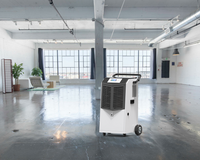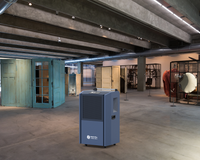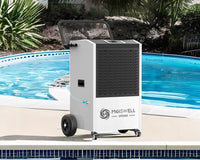Maintaining a comfortable and healthy indoor environment is crucial for any business. When it comes to controlling humidity levels, two common options are commercial dehumidifiers and traditional air conditioning systems. Both serve different purposes and offer unique advantages. In this article, we'll compare commercial dehumidifiers and traditional air conditioning systems, helping you determine which is the right choice for your business.
Humidity Control
1. Commercial Dehumidifiers: Commercial dehumidifiers are specifically designed to target and reduce excessive moisture in the air. They extract moisture effectively, helping prevent issues such as mold growth, equipment damage, and musty odors. Dehumidifiers provide precise control over humidity levels, allowing you to maintain a comfortable and healthy environment.
2. Traditional Air Conditioning: While air conditioning systems do have some dehumidifying capabilities, their primary function is to cool the air. They may lower humidity levels to a certain extent but are not as effective as dehumidifiers in areas with high humidity levels or specific moisture-related issues.
Energy Efficiency
1. Commercial Dehumidifiers: Dehumidifiers are generally more energy-efficient when it comes to addressing humidity concerns. They focus solely on moisture removal, which allows them to operate more efficiently in reducing humidity without the need to cool the air excessively. Additionally, many commercial dehumidifiers come with energy-saving features such as programmable timers and adjustable fan speeds.
2. Traditional Air Conditioning: Air conditioning systems primarily focus on cooling the air, which requires more energy consumption. While they do remove some moisture in the process, they may not be as efficient as dehumidifiers in solely addressing humidity concerns. If your primary concern is moisture control, using air conditioning alone may result in higher energy costs.
Targeted Application
1. Commercial Dehumidifiers: Dehumidifiers are ideal for businesses that have specific moisture-related issues, such as basements, storage areas, laboratories, or facilities with high humidity requirements (e.g., swimming pools or spas). They are designed to target and extract moisture from the air, making them effective in areas where excess humidity is a concern.
2. Traditional Air Conditioning: Traditional air conditioning systems are suitable for businesses that require overall temperature control and cooling for the entire space. They are effective in larger areas where maintaining a comfortable temperature is the primary goal.
Choosing between a commercial dehumidifier and traditional air conditioning depends on your business's specific needs. If your primary concern is excessive moisture and humidity control, a commercial dehumidifier is the ideal choice. It offers efficient moisture extraction, precise humidity control, and energy-saving features. On the other hand, if your focus is on overall cooling and temperature control for a larger space, traditional air conditioning may be more suitable.





